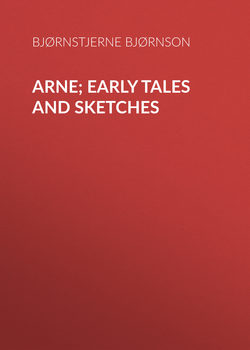Arne; Early Tales and Sketches

Реклама. ООО «ЛитРес», ИНН: 7719571260.
Оглавление
Bjørnstjerne Bjørnson. Arne; Early Tales and Sketches
ARNE. EARLY TALES AND SKETCHES WORKS OF BJÖRNSTJERNE BJÖRNSON PATRIOTS EDITION
PREFACE
CHAPTER I
CHAPTER II
CHAPTER III
CHAPTER IV
CHAPTER V
CHAPTER VI
CHAPTER VII
CHAPTER VIII
CHAPTER IX
CHAPTER X
CHAPTER XI
CHAPTER XII
CHAPTER XIII
CHAPTER XIV
CHAPTER XV
CHAPTER XVI
EARLY TALES AND SKETCHES. THE RAILROAD AND THE CHURCHYARD
CHAPTER I
CHAPTER II
CHAPTER III
THROND
A DANGEROUS WOOING
THE BEAR HUNTER
THE FATHER
THE EAGLE'S NEST
Отрывок из книги
"Arne" was written in 1858, one year later than "Synnöve Solbakken," and is thought by many to be Björnson's best story, though it is, in my opinion, surpassed in simplicity of style and delicate analysis of motives, feelings, and character by "A Happy Boy," his third long story, the translation of which is now in progress, and which will follow this volume.
Norway's most eminent composers have written music for many of Björnson's poems, and made them favorite songs, not only with the cultivated classes, but also with the common people. To the songs in "Arne" melodies were composed by Björnson's brilliant cousin, Rikard Nordraak, who died in 1865, only twenty-three years old, but who had already won a place as one of Norway's greatest composers.
.....
The man with the mild face rose more slowly and went straight over to Nils, who was still dancing. "You had better stop a little," said the man. Nils did not hear, and then the man took him by the arm. Nils tore himself away and looked at him. "I do not know you," said he, with a smile. "No; but you shall learn to know me," said the man with the mild face, and with this he struck Nils a blow over one eye. Nils, who was wholly unprepared for this, was plunged heavily across the sharp-edged hearth-stone, and when he promptly tried to rise, he found that he could not; his back was broken.
At Kampen a change had taken place. The grandmother had been growing very feeble of late, and when she realized this she strove harder than ever to save money enough to pay off the last installment on the gard. "Then you and the boy will have all you need," she said to her daughter. "And if you let any one come in and waste it for you, I will turn in my grave." During the autumn, too, she had the pleasure of being able to stroll up to the former head-gard with the last remaining portion of the debt, and happy was she when she had taken her seat again, and could say, "Now that is done!" But at that very time she was attacked by her last illness; she betook herself forthwith to her bed, and never rose again. Her daughter buried her in a vacant spot in the churchyard, and placed over her a handsome cross, whereon was inscribed her name and age, with a verse from one of Kingo's6 hymns. A fortnight after the grandmother was laid in her grave, her Sunday gown was made over into clothes for the boy, and when he put them on, he became as solemn as though he were his grandmother come back again. Of his own accord, he went to the book with big print and large clasps she had read and sung from every Sunday, opened it, and there inside found her spectacles. These the boy had never been permitted to touch during his grandmother's lifetime; now he timidly took them up, put them on his nose, and looked through them into the book. All was misty. "How strange," thought the boy, "it was through them grandmother could read the word of God." He held them high up toward the light to see what the matter was, and – the spectacles lay on the floor.
.....